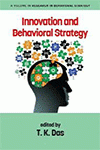
Innovation and Behavioral Strategy
Edited by:
T. K. Das, City University of New York
A volume in the series: Research in Behavioral Strategy. Editor(s): T. K. Das, City University of New York.
Published 2023
Behavioral strategy continues to attract increasing research interest within the broader field of strategic management. Research in behavioral strategy has clear scope for development in tandem with such traditional streams of strategy research that involve economics, markets, resources, and technology. The key roles of psychology, organizational behavior, and behavioral decision making in the theory and practice of strategy have yet to be comprehensively grasped. Given that strategic thinking and strategic decision making are importantly concerned with human cognition, human decisions, and human behavior, it makes eminent sense to bring some balance in the strategy field by complementing the extant emphasis on the “objective” economics-based view with substantive attention to the “subjective” individual-oriented perspective. This calls for more focused inquiries into the role and nature of the individual strategy actors, and their cognitions and behaviors, in the strategy research enterprise. For the purposes of this book series, behavioral strategy would be broadly construed as covering all aspects of the role of the strategy maker in the entire strategy field. The scholarship relating to behavioral strategy is widely believed to be dispersed in diverse literatures. These existing contributions that relate to behavioral strategy within the overall field of strategy has been known and perhaps valued by most scholars all along, but were not adequately appreciated or brought together as a coherent sub-field or as a distinct perspective of strategy. This book series on Research in Behavioral Strategy will cover the essential progress made thus far in this admittedly fragmented literature and elaborate upon fruitful streams of scholarship. More importantly, the book series will focus on providing a robust and comprehensive forum for the growing scholarship in behavioral strategy. In particular, the volumes in the series will cover new views of interdisciplinary theoretical frameworks and models (dealing with all behavioral aspects), significant practical problems of strategy formulation, implementation, and evaluation, and emerging areas of inquiry. The series will also include comprehensive empirical studies of selected segments of business, economic, industrial, government, and non-profit activities with potential for wider application of behavioral strategy. Through the ongoing release of focused topical titles, this book series will seek to disseminate theoretical insights and practical management information that will enable interested professionals to gain a rigorous and comprehensive understanding of the subject of behavioral strategy.
Innovation and Behavioral Strategy contains contributions by leading scholars in the field of innovation with an interest in researching behavioral perspectives. The 9 chapters in this volume deal with a number of significant issues relating broadly to the behavioral aspects of innovation, covering topics such as emotional climate for catalyzing innovation, leadership in open innovation, environmental disruptions, collaborative communities, performance of small-scale entrepreneurs, supply chain innovation alliances, new partner selection for innovation, coopetition in networks, and public-private innovation alliances. The chapters include empirical as well as conceptual treatments of the selected topics, and collectively present a wide-ranging review of the noteworthy research perspectives on innovation and behavioral strategy.
CONTENTS
About the Book Series, T. K. Das. Inspired Teams: Building a Holding Environment to Catalyze Innovation, Steven B. Wolff, Michele Norton, Dave Silberman, and Brian Moran. Strategic Behaviors of Leaders in Open Innovation: The Role of Ambidextrous Leadership and Entrepreneurial Behaviors, Parisa Haim Faridian and Kathryn E. Weaver. Behavioral Strategy, Innovation, and Environmental Disruptions, Mzamo P. Mangaliso, Leah Z. B. Ndanga, and David L. Major. Open Innovation Through a Collaborative Community of Firms: An Emerging Organization Design, Charles C. Snow and Refik Culpan. Towards a More Comprehensive Capital-Based Framework for Explaining Performance of Small-Scale Entrepreneurs: Illustrations From the Ghanaian Marketplace, Joseph Ofori-Dankwa, Micah
DelVecchio, and Akosua K. Darkwah. New Product Performance Through Channeling in Supply Chain Innovation Alliances: The Nexus of Collaboration Intensity, Divergent Communication Schemes, and Alliance Duration, Ricarda B. Bouncken and Robin Pesch. Innovation and New Partner Selection: Theory and Exploratory Evidence From the Information and Communications Technology Sector in the Netherlands, Gjalt de Jong. Coopetition in Networks and Its Implications for Innovation, Xiaotian Yang and Fen Zhang. Public–Private Innovation Strategic Alliances for SMEs: An Emerging Model, George Tsekouras and Costis Kompis. About the Contributors. Index.
-
Paperback979-8-88730-060-3
Web price: $45.04 (Reg. 52.99)
-
Hardcover979-8-88730-061-0
Web price: $80.74 (Reg. 94.99)
- eBook979-8-88730-062-7

- BUS041000 - BUSINESS & ECONOMICS: Management
- BUS063000 - BUSINESS & ECONOMICS: Strategic Planning
- BUS085000 - BUSINESS & ECONOMICS: Organizational Behavior








